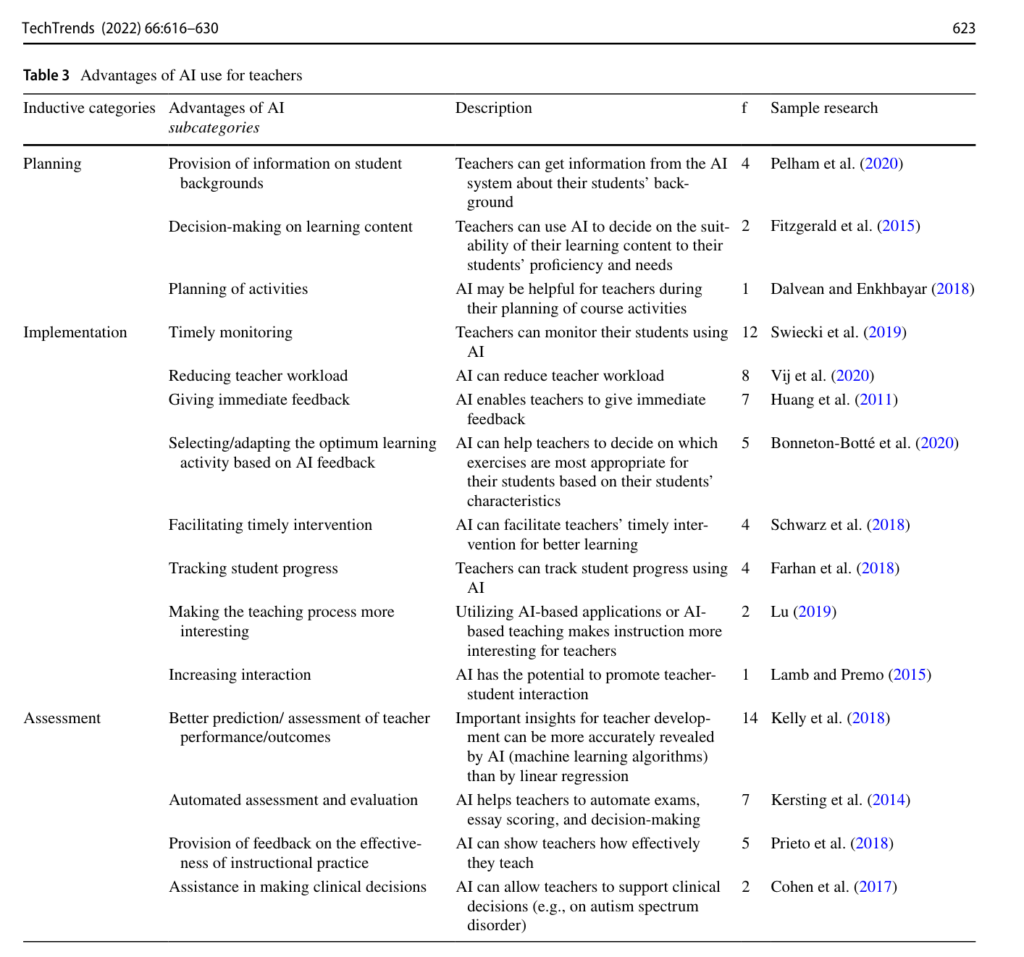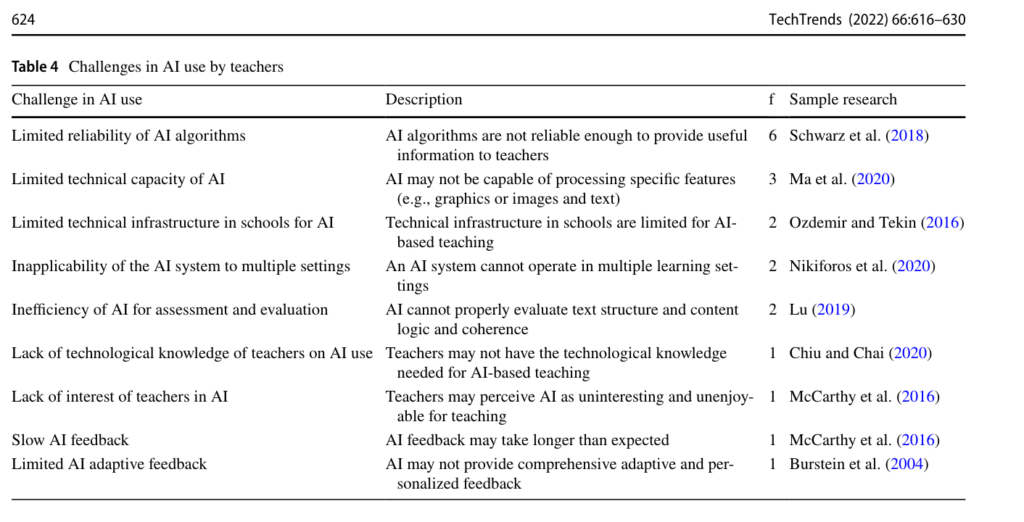As the use of artificial intelligence (AI) is becoming increasingly widespread, and there have been numerous advancements in the field of education regarding AI over the past couple of years, I believe that one blog post on the use of AI by teachers is insufficient. Therefore, I have chosen to write a second blog post discussing another piece of literature.
The article I have recently been examining is titled ‘The Promises and Challenges of Artificial Intelligence for Teachers: A Systematic Review of Research’ (Celik et al., 2022). In this article, the authors conducted an analysis of various AI-based research in the education field and identified some of the promises and challenges associated with the use of AI for planning, implementation, and assessment.
In education, “AI-supported instruction is expected to transform education” (Celik et al., 2022, p. 616). This is a complex and debatable topic because there are many positives, challenges, and ethical dilemmas about how AI can be used by teachers to support learning. Celik et al. (2022) also state that there has not been effective integration of AI into teaching and learning in schools because the “developers know little about learning sciences and lack pedagogical knowledge” (p. 616). This makes it difficult to have a tool which is accessible and reliable for teachers because those who develop the technology do not know what goes into creating effective, engaging, and inclusive activities and effective, reliable, and insightful assessment. Ultimately, the authors state that “to achieve successful AI implementation in education, various stakeholders, specifically, teachers, should participate in AI creation, development, and integration” (Celik et al., 2022, p. 617). I completely agree with this statement as, for example, a program that is used by an engineer should be created, reviewed, and experimented with by an engineer. Adding on, the authors also state that it is important to allow pre-service teachers the opportunity to develop their AI awareness and skills prior to becoming certified teachers (Celik et al., 2022, p. 626). This will increase the implementation of AI into schools and students can assess the ethical dilemmas through university discussions and course work.
Will teachers still be needed if artificial intelligence is used for education purposes?
A distinction that I appreciated the authors included in the literature is regarding the teachers’ role in AI-based education. The authors state that the adoption of AI in schools “does not imply that we will need fewer teachers in the future” (Celik et al., 2022, p.617). This is a topic that I find myself engaging with those in other fields of study a lot because of how others see the tools that students are now questioning education as a whole. I completely agree with the authors because AI is unable to replicate the effectiveness of teacher planning, implementation, and connection. That being said, this can be increased with teachers having an active role through AI-based research in education because teachers have an essential role in the learning and teaching process. This connects back to the other article which I discussed in my previous blog post about how AI-based tools can then be used effectively as a teacher’s assistance in planning, implementation, and assessment.
The Benefits of AI for Teachers
As this is an article which I could dissect and analyze for a long time, to be respectful of my readers, I am going to jump to share their findings on the advantages of AI for teachers. Through this study, the authors found many benefits of using AI-based technology to assist teachers. These include assisting teachers during the planning, implementation, and grading.

Above is a table from Celik et al. (2022, p. 623) that illustrates the advantages of AI use for teachers. Although there are many advantages of AI-based technology for teachers and this table only references a portion of them, I want to emphasize that this technology should be used only as a teacher assistance tool and not a teacher replacement tool. As seen above, some of the advantages include decision-making on learning content, planning of activities, and tracking student progress. These are important pieces of the learning and teaching process that need to be reviewed, edited, and redesigned by teachers before they are implemented for student learning.
The advantage of using AI technology that interests me the most is how it can decrease teacher workloads. This is a topic that I discussed in my previous blog post, and it is the topic of my EDCI 570 presentation at the end of November. Although this article briefly describes how AI systems can decrease the workload for teachers, workload is an important discussion point of the teaching profession and any ways in which teacher workload can decrease without sacrificing the quality of instruction would be beneficial.
The challenges of AI use by teachers

The challenges of AI use by teachers are described by the authors through another visual. As we can see above, the most prominent challenges of AI for teachers are regarding the limitations of AI-based technology. As stated by the authors, “one of the most observed challenges is the limited technical capacity of AI” (Celik et al., 2022, p.625). The implications of this are that teachers will not get reliable information from AI technology when planning or assessing. This validates the importance of ensuring that AI is being used as an assistant tool rather than a replacement for an educator.
Another challenge of AI use for teachers is regarding accessibility. In general, there is a lack of teachers who are educated in AI and there is a lack of technical infrastructure in schools (Celik et al., 2022, p. 625). This means that integrating AI into schools in meaningful ways becomes a challenge.
Through analyzing these challenges of AI for teachers, I think they can be separated into 3 different categories. Category one is teacher-created AI resources. This connects to the author’s idea that those who are developing AI technology “know little of the learning science and lack pedagogical knowledge” (Celik et al., 2022, p. 616). These resources need to be created by educators, for educators. This also includes ensuring that the technology can successfully comprehend multimodal learning strategies and assessments. Category two is teacher education. Teachers need to be educated on how to use AI technology and how to apply AI in their classrooms. This needs to be done in meaningful ways to ensure that teachers are engaged, interested, and motivated to support this technology. Finally, category three is regarding technology in schools. Integrating technology and artificial intelligence in schools is impossible unless there is adequate and an abundant amount of technology that is accessible and reliable by teachers. Through these three categories, the challenges of AI use by teachers can be minimized and teachers will, hopefully, be able to use AI technology for their benefit, the students’ benefit, and the school’s benefit.
AI-based technology for assessment:
This is a topic which I wrote about in my previous blog post. To give you a reminder of my opinions on using AI for assessment, here is my opinion:
“I ethically and morally have issues with teachers using AI for assessment. This is because I believe it undermines what education and teaching is about. Teaching is about providing support for students while they learn and giving them personalized, informative, and relative feedback to the student. This assessment is also meant to help you as an educator guide instruction for your students. By having ChatGPT assess student work, you are immediately losing the ability to fully understand students’ abilities and what instruction is needed for developing their skills in different subject areas. It would cut down the time that teachers work outside of the school day, but at what costs?”
Through reading this article, I stand by my opinion. However, I am interested in how teachers can use AI to help their instruction methods and assessments. Celik et al. (2022) state that “AI could help provide teachers feedback on the effectiveness of their instructional practice” (p. 623). After collecting student data, teachers can presumably use AI to model student progress and areas of improvement. The models give teachers the opportunity to improve their instructional practices (Celik et al., 2022, p. 623). I was not aware that this technology could be used in this way. This interests me because the teacher is still assessing and giving students personalized feedback, but it also could give insight to the teacher which could have gone unnoticed.


Hi Josh,
You might be interested in this session offered by Dr. Lydia Cao & Professor Chris Dede from Harvard on the topic I attended a few weeks ago.
Abstract
Generative AI presents both opportunities and challenges for education. In this webinar for educators, we aim to equip you with the insights and strategies needed to navigate this evolving landscape. We focus on instructional strategies to harness the benefits of AI while also nurturing the unique abilities of humans to tackle global challenges in the 21st century.
This webinar will help you to:
Demystify AI: Understand the capabilities and limitations of generative AI. Distinguish human intelligence from AI via analogies and illustrations.
Re-envision education: Embark on a paradigm shift, moving away from a product-focused approach to a process-focused model of education. Embrace the transformative power of the learning process and move beyond transactions where “learning products” are exchanged for grades.
Address concerns about plagiarism: Examine the decline of curiosity and intrinsic motivation in traditional education systems, and advocate for next-generation models of education that foster an ecosystem of motivation and learning.
Maximize educators’ impact: Explore the crucial role educators play in the AI-enhanced learning landscape. Discover concrete strategies to demystify AI, promote the learning process, honour learner agency and cultivate human skills that AI can’t replicate.
https://contactnorth.zoom.us/rec/play/UDTRL6dLgszKQVSSrGCm7aGvKtS06OCstax3q951Mzi6UE9jvrjnED_91U8XoQL56FDT-O70U11-3W3f.dNKGyLV0MtLObwge